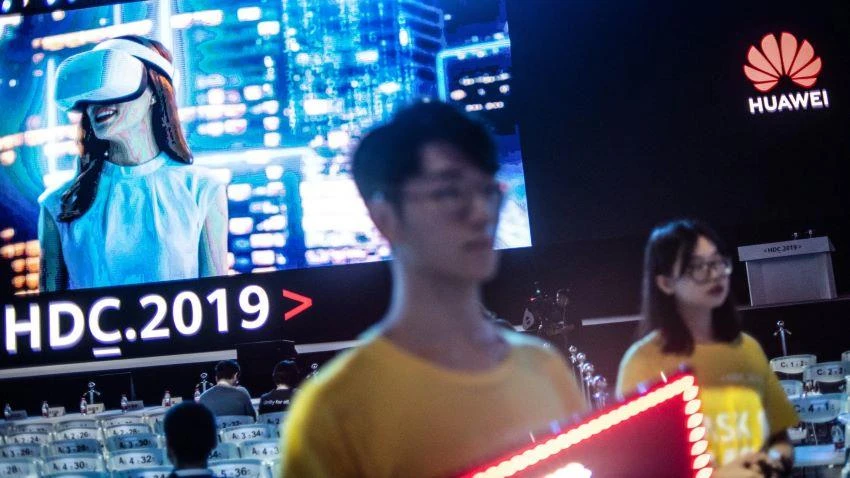
China's Huawei Technologies on Friday unveiled its own smartphone operating system which it said could replace Google's Android in just "one to two days" if access to the world's most popular mobile platform were blocked by the U.S.
The tech giant said its Harmony OS -- pronounced Hongmeng in Chinese -- was more flexible than Google's Android, capable of supporting all devices from smartphones and smart speakers to wearables, smart displays and next generation automobiles. The system was revealed at Huawei's annual developers' conference in Dongguan by Huawei's Consumer Electronics Group CEO Richard Yu.
"We can start using our Harmony OS anytime for smartphone and the migration from Google's Android to our own Harmony OS is not that difficult... We can do it in one to two days," Yu said.
Harmony OS is a key weapon in Huawei's fightback against the campaign by the U.S. government to restrict the technological development of the world's second biggest smartphone maker. It will allow the group to offer a common ecosystem of services and applications across all of its consumer devices.
However, in an implicit admission that Harmony OS could struggle in a consumer segment where 80% of all smartphones carry the Google system, Yu said Huawei would continue to prioritize using Android for its smartphones if allowed.
Huawei accelerated development of Harmony OS after the U.S. government blacklisted China's biggest tech company to restrict its access to American technologies in May. Several Japanese carriers had postponed selling the new Huawei models amid concerns about whether the Android system and popular apps like Gmail and Youtube would have access to Google upgrades. Most have since pressed ahead with sales, although it is still not clear whether the upgrades will be available.
The world's largest telecom equipment maker has been preparing for a possible crackdown since its smaller peer ZTE was cut off from U.S. supply suddenly last year, which caused it to cease operation for months. Huawei has stockpiled up to one year's worth of crucial components to ride out the crackdown, and has asked many suppliers to expand production in China to counter the Washington offensive, Nikkei Asian Review first reported.
Yu said the first major product to be powered by the Harmony OS would be its upcoming smart TVs, under the Honor brand. These would be unveiled Saturday.
Yu said the company had decided to introduce Harmony OS as an "internet of things" platform first, rather than on smartphones, because of "considerations for the ecosystem."
Huawei intended to make Harmony open source to encourage wider use. "We want it [HarmonyOS] to be global so we want to invite developers to join us as we build out this new ecosystem. We could together build a leading OS in the world." To realize the goal, the company announced Friday it would spend $1 billion to support developers building a bigger ecosystem with Huawei.
Huawei started developing the system two years ago and now has 4,000 to 5,000 engineers working on Harmony OS, according to Yu. With a more unified ecosystem across various devices, it could offer better security against hacks than Android, Yu said.
However, analysts said big challenges remained.
"Harmony OS's biggest weakness is that it has not yet grown into an ecosystem. It does not yet have apps developed for the OS. That's why Huawei said the OS will be first available on smart screens under its sub-brand, instead of on smartphones," said Chiu Shih-fang, a veteran smartphone and supply chain analyst at Taiwan Institute of Economic Research.
If the Chinese company fails to secure access to Google's service later this year, it is possible that sales of its upcoming smartphone lineups will take a hit in overseas markets due to a lack of confidence among telecom operators and consumers, the analyst said.
"However, it is still the right thing to do for Huawei in the longer term, to build its own operating system and reduce its reliance on American companies, given the fast-changing geopolitical tensions between Washington and Beijing," Chiu said.
Huawei has so far shown some resilience in the face of the U.S. restrictions but the Washington ban is still weighing on its smartphone business. Yu acknowledged that his company could not overtake Samsung Electronics as the world's biggest smartphone maker this year as it had hoped due to the trade tension and uncertainties in the market.
Huawei's highly anticipated foldable smartphone, Mate X, a rival to Samsung's Galaxy Fold, will be available for customers as soon as next month but it could still be delayed as the device required additional tests on a 5G network, Yu told a small group of reporters in Dongguan on Friday. Samsung also delayed the launch of the Galaxy Fold to September due to quality issues. Both devices were unveiled in February.
"We hope to still stay at the current position of the second-largest smartphone maker for 2019 but we could not achieve our previous goal to become world's No. 1 by the end of this year," Yu said.




















